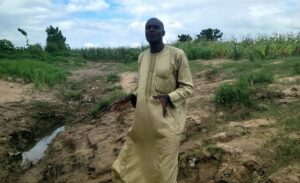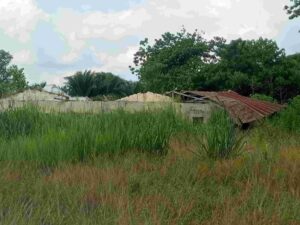In this report, Arinze Chijioke attempts to unravel why residents of Umunwanwa, a community in Abia State, have continued to be threatened by erosion years after, despite an intervention project by Anambra Imo River Basin Development Authority (AIRBDA).
As farmers fell into spates of happiness when the clouds began to gather one Thursday this June, residents of Ngodo in Umunwanwa, one of the communities in Umuahia South Local Government, Abia State, prepared for yet another disaster – a building collapse, gully expansion or submerged houses.
None of that happened.
But this is the sad reality that families in Ngodo – where there are two Gully erosion sites – have dealt with. Whenever it starts raining, men in Ngodo come out with shovels and holes and wait to redirect water from flowing into their houses.
For more than a decade, the menace has destroyed property, pulled down houses and threatened livelihoods. Many residents have relocated for fear of losing their lives. On Saturday, June 8, young men from this predominantly agrarian community gathered to fill up an expanding Gully with sand and stones provided by a resident who had renovated his house. Each time it rains heavily, these gullies expand.
Researches have shown that Abia State is prone to flooding and erosion, which can be attributed to the soil types found across the state, the low-lying topography and increased rainfall.
Back In 2018, Ngodo experienced what residents say is the worst Gully expansion which swallowed houses, cut off the road linking the area with other locations within the community.
“The walls of my uncle’s fence and the gate to his house went into the Gully. We feared for our lives that day,” said a youth leader in the community, Chucks Nwadinobi.
“At least 10 houses were submerged while many people have been rendered homeless.”

To tackle the menace at the time, residents tasked themselves and with the support they received from family members in the diaspora, running into millions of naira, they filled up the Gully with sand.
Nwadinobi said that community members only stopped contributing after they discovered that they could no longer handle the situation. He adds that these Gullies which are now threatening to swallow Ngodo, started gradually but were left unattended to.

Calls for help
Leaders – both political and traditional – have on several occasions raised concerns over the devastating impact of Gully erosion in Umunwanwa. In October 2018, Sam Onuigbo who represents Ikwuano/Umuahia Federal Constituency at the House of Representatives, moved a motion on a matter of urgent public importance on the menace of gully erosion and the imminent pipeline explosion in Umunwanwa. One of the sites had ruptured an NNPC pipeline, forcing the petroleum products to leak, a situation which constituted health hazards to the community and other surrounding communities.
Onuigbo followed this up by writing to the Ecological Fund Office and paying for the design of erosion control work in Umunwanwa to enable the EFO immediately take action on the issue.
“I think that the Pipelines and Product Marketing Company (PPMC) and NNPC must join hands with the EFO to urgently address the Umunwanwa situation.
“Umunwanwa is sitting on a keg of gun powder and if nothing is urgently done, the imminent tragedy will be mind boggling,” he said in 2019.
Onuigbo asked the NNPC to join hands with the EFO to urgently address this issue as “Umunwanwa is sitting on a keg of gun powder and if nothing is urgently done, the imminent tragedy will be mind boggling.”
“As a people who value the lives of its citizens, we do not want a repeat of what happened at Osisioma were over 200 people perished as a result of petroleum pipeline explosion,” he said, making reference to the dangers of the NNPC pipeline. “Not by any stretch; what we want is prompt action.”
Sadly, nothing changed.
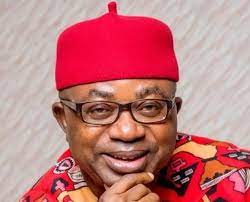
The contract that restored hope
In 2017, a year before the Gully expansion, the Anambra, Imo, River, Basin Development Authority, (AIRBDA), a parastatal under the Federal Ministry of Water Resources, awarded contracts for erosion and flood control works in Umunwanwa community. This was supposed to help mitigate the worsening Gully expansion in Ngodo.
Between December 2018 and May 10 2024, the AIRBDA paid two contractors; Gunok West Africa Limited and Prime design & Build Engineering Limited different amounts for the execution of the project. Available document from the budget office shows that the project had a budget of N20 million.
A freedom of information (FOI) request was sent to the AIRBDA on Friday, June 21, requesting specific details of the project, including the contract description, value, amount paid, level of completion, contact details of the contractors and date the project was advertised. However, at the time of this publication, no response was received from the agency.
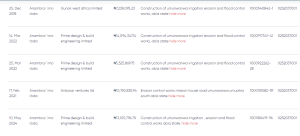
But findings on the govspend platform, which tracks and analyses the Federal Government spendings over time, show payments amounting to N39 million, above the amount budgeted for the project, according to available data.
A further breakdown shows that while Gunok West Africa limited received N7.2million (7,238,095) on December 25 2018, Prime design & Build Engineering Limited received three different payments, amounting to over N32million, including N14million (N14,094,347) on 14 March 2022, N5.5 million (N5,525,869) on 25, March 2022 and N13.1million (13,105,796) which is the most recent payment on 10, May 2024.
Residents rolled out their drums and heaved a sigh of relief when they heard of the project, hoping that when completed, it will tackle the menace of erosion in the community.
“We were happy because we felt that the government had finally heard our cry,” said Personal Assistant to the traditional ruler of Ngodo, Stephen Ihuoma Chukwu Nwosuagwu, who relocated with his family when the gullies started expanding.
“The situation had brought untold hardship to our people whose homes and farms have been destroyed.”
However, a visit to Ngodo shows that despite payments made, only a one-sided drainage was constructed from the entrance to the road after it was graded in 2019. Prime design only resumed the construction of a drainage towards the end of the road and where the river that used to serve the community is located this year, 5 years after.

The one-sided drainage was also not constructed in a way to contain the volume of water that flows through the community whenever it rains, hence the drainage usually overflows. According to findings, the road was supposed to be asphalted, with two-side drainages to enable easy passage of water.
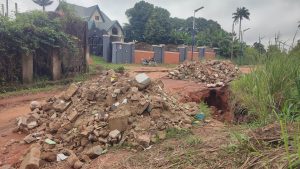
President General of Ngodo, Jonathan Anyanwu, told this reporter that even the earthwork was poorly done by the contractor. According to him, there was no proper compaction of the soil to reduce pore space between them and ensure durability.
“The contractor came and did whatever he wanted, collected money and left,”Anyanwu said.
“We were never carried along while he worked on the drainage.”
Anyanwu further said that the contractor hardly picked whenever he called to make inquiries about the status of the project and why it was being delayed. He added that AIRBDA hardly comes to assess the level of implementation of the work.
“The agency does not even call us to know if the contractor comes to site, they only communicate with the contractor.
“Now, we don’t know what is happening to the project,” he said.
Residents also say that the have not seen any worker from Gunok West Africa Limited which received the first part of payment for the project. When asked if the project was supposed to be executed by two contractors, an engineer in the Construction and Supervision Division at AIRBDA, Peter Ononiwu failed to provide answers.
Anyanwu said that it was worrying how the contractor abandoned work where it was supposed to begin and went towards where the project was supposed to terminate. But Ononiwu, who findings show, is handling the erosion project in Ngodo, defended the decision to move towards the end of the road, saying that it was informed by the need to discharge the run off which is entering the river.
He claimed that what the project needs is either remediation to stop further degradation or reclamation. He however noted that the agency and the contractor cannot engage in any of those, hence they are only controlling the run off and reducing the damaging effect of the erosion.
He further stated that the one-sided drainage was provided at the beginning of the project because that is what the available funding allowed for at the time, adding that what is needed for the road is a proper earthwork after which a Geofill – a natural “soil” infill-is installed.
Worsening erosion
Within the period that the project was delayed till now, the Gullies have expanded and wreaked more havoc in Ngodo. The road itself has become a death trap. Whenever it rains, water flows freely into the gully at the beginning of the project without control. More residents have had to relocated from their homes.
The Chief of Security of Ngodo, Uka Obasi, says he has lost farmlands where he planted Yam and Cassava and economic trees and this has affected his family income. It is the same story for other families. The stream upon which families depended is also gone.
Car owners and motorcyclists who spoke to Ikengaonline said that they now dread plying the road because of fears that it might sink in. One of them, Chucks Williams, said that they have found an alternative route into Ngodo. Residents trek passed the road, with their minds trembling.
In 2021, Chinyere Uba’s house was submerged by erosion.
“We lost our livestock as a result; the erosion brought reptiles into our rooms, our cloths were drenched and it went away with some of our property,” she said.
In May 2020, the member representing Umuahia South State Constituency, Hon. Jeremiah Uzosike, again raised it as a matter of urgent public importance to the plenary session at the State House of Assembly Complex.
He said that the Assembly had written to both the Ecological Fund office, Nigeria Erosion and Watershed Management Project (NEWMAP) and the Niger Delta Development Commission (NDDC) which had abandoned a road project in the community. Yet, nothing has changed.
Available information on the website of the Corporate Affairs Commission shows that Prime design & Build Engineering Limited which was registered on August 13 2010, is active, with Ejikeme Chukwu, Ihunweze John, Umekesiobi Caius, Nwadike Chikezie and Ihunweze Uchechukwu as persons with significant control while Gunok West Africa Limited registered on March 3, 2015 has Nonso Okafor as the only person with significant control.
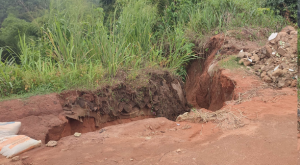
Contractor working with available fund – AIRBDA
Ononiwu said that the Umunwanwa project had not been abandoned by the contractor, instead, funding has remained a major challenge slowing down the execution.
“When the contractor exhausts available fund, he waits for more funding and that is what has caused the delay.”
“We have checked the start point and traced it to the end point,” he said.
He further said that what Ngodo and other parts of Umunwanwa need is an intervention from agencies like the ecological fund office or the environment ministry that has access to huge funds.
Ikengaonline tried to reach out to the contractors for their own side of the story. But there was no functional website, email or contact available online. Searching further, an Instagram account belonging to Nonso Okafor who identified as the CEO of Gunok West Africa Ltd was found after which a request was sent to him on Tuesday, June 11. However, at the time of this publication, he was yet to accept the request.
This Report is part of activities by the Ikenga Media & Cultural Awareness Initiative (IMCAI) under the Collaborative Media Engagement for Development Inclusivity and Accountability Project, a multi-level intervention for media independence and government accountability, managed by the Wole Soyinka Centre for Investigative Journalism (WSCIJ) and supported by MacArthur Foundation.


